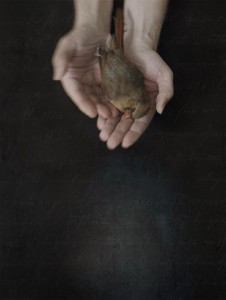Laurie Saurborn: One striking aspect of your poem “Dark Feather” is how it captures the movement of flight. Flight, or that which makes flight possible, is present in the spilt paint that curves “like a crow’s wing.” It is here in the spring, which will “land light / on those boulders.” As it meditates upon its subject, the movement of the poem is akin to circling, as if the speaker is a bird looking on all this from far above. Could you tell us more about how you came to write this poem, and how close or far you feel from the events it describes?
Christine Fadden: When I sat down to write this poem, it came quickly, which normally would signal to me: Don’t trust it! I know you poets—I’ve heard the stories of nights lost agonizing over the placement of a comma. But also, as a fiction writer, hell, I’ve been working on my novel since 2010. Writing must take time, right? 100 words or 10,000, we had better revise. I did very little revising with “Dark Feather”—I changed a verb tense or two, adjusted a few line breaks.
In a way though, I had been sitting with this material for months, mourning the loss of my aunt (the subject of this poem), and so maybe my sense that I just came to the page and blurted my heart out isn’t entirely accurate.
It’s interesting: I didn’t “circle” or strive for distance on purpose, and did feel the piece came across as perhaps too cold and blunt (i.e. “this is when you start dying”) when in fact, my aunt was the first loved one I lost as an adult—and grieving her brought me to my knees. I had lived with her fairly recently, in my early forties, while working on my novel.
The home she and my uncle opened up to me, sits on a quiet ridge in a rural town. The three of us spent lots of time in the backyard together (the front yard, where she fell, not so much). Either way, when I got the call that she had fallen and hit her head, I imagined one scenario. Until I could fly back east—it took me a few days to get a grip on what was happening even though I sensed immediately she’d never regain consciousness—details trickled in. Of course, details don’t help. They change nothing. But maybe the circling has something to do with those days in which I was trying to make sense of the impossible—a very active and healthy woman falls not from a great height, but down three stairs—and that’s it?
Maybe the circling is an echo of “No, no, no.”
My aunt was lifeflighted to Pittsburgh. Maybe that’s the angle I had to take—I’m in that helicopter; I cannot be on that ground, because of some deadening force it now contains.
LS: I usually associate feathers with flight, and flight with flying (or running) away. But this poem maintains a tender, mournful attention on the “you,” as if creating a place for the absent loved one to rest. Was it difficult to revisit this event? Was writing “Dark Feather” a cathartic process?
CF: My aunt traveled the globe, but if she’s resting anywhere, it’s in one of her trees—or in the heart of one of the birds she fed, saved, or counted. More difficult than revisiting the event itself, is revisiting certain questions: Why, when she texted me four days before she fell, did I cut her short with an ‘I have to work now’ message? If and when I find an agent for my novel, will she know? (Damn it, I want her to know!) Did I ever directly say “thank you” for the time, space, and support she gave me?
My aunt gave me a place to rest, so that for whatever it’s worth, I could create. So yes, even if I am able to logically or artistically process the event itself, over time, those questions will always haunt me. I know it’s senseless to ruminate that way and I probably did thank her more than once, but I’m a writer—ruminating is one thing I excel at.
Forcing myself to fit just a portion of the pain onto one single page definitely was cathartic, but given the way grief waves move and mount, eventually I’ll need to hit a release valve again—somehow.
LS: Throughout the poem, careful details abound: Drunkard Joe, tomatoes, seed and suet. But the non-human primarily populates the landscape of the poem: the cats are okay, but Drunkard Joe is dead and there are no other people around. How did you decide what details had a place in the poem, and which did not?
CF: At the time of writing this poem, I wasn’t ready for these interiors—conversations over coffee in the kitchen, the human heart and all the ties back to so many amazing childhood summers and holidays. My uncle is like a father to me, and I didn’t dare tread on his suffering, or on that of my cousins or my mother.
I probably had to take the poem outdoors, not because my aunt died there, but because no matter the season, she did so much living there. She moved out there. I can only describe the details I included as shorthand to her soul.
LS: Among many other things, you are at work on a novel, you write short stories, and you work as a professional ghostwriter, editor, and writing coach. All to say, you write a ton of prose. Could you speak about how you manage to traverse the poetry/prose divide? Or do you feel there is a divide? Are there reasons you chose to address this event through poetry? Have you written about it in prose?
CF: I do read and write prose for a living, and interestingly enough, two of the projects I’m currently collaborating on are about death—sudden and assisted. Also, I just put my cat of fourteen years down. I’ve cried more in the past year than I have in any other and wonder if this is my time to learn some core aspect of grieving, or of love. I doubt very much I’ll write about the “Dark Feather” event, or any death-related events, in my own work in the near future—I need to get back to the hilarious! It’s too bad death is so rarely funny.
But the poetry/prose divide—yes, for me there (usually) is one. Always, the words we choose and the way we set them next to one another matter, but in prose, sentences have to pull the reader much further down the road. Even in some flash fiction, I think, sentences and paragraphs hold, cast, and propel a long arc; whereas, the words, phrases, and lines of poetry, to me, feel like piercing instruments. There is something, for me anyway, that is blunter about poetry. There’s no arguing with it, no denying it. I set out to write a poem when I need to put my finger in the socket. I want to wake up. I go to story to roll around a little and to dwell.
Now that I’m answering this question, I see I probably don’t want to dwell on the events of “Dark Feather.” I wonder, because the death was so sudden, how I would work it out as an essay or short story—and if I were to go there, wouldn’t the piece end up being more about my aunt’s life? Or about how her death has affected everyone—one year later? Hmm, you’ve given me more to process, about the grieving process and the writing process! Now we’re talking about content dictating form, and (again) about distance from the event. There are probably infinite ways to talk about distance, right? (I love that topic.) But, for now, I have no prose in me for this—it’s still too fresh.
LS: Another thing I admire about this poem—about your process—is that you take one detail from a shocking moment and use it as a way to enter an alternate reality, one where time vaults from past to present to future, one where your aunt is absent but her cats are taken care of and where the catnip still grows. As you wrote, were you surprised by something that found its way to the page?
CF: Yes: I did not see the streak of black paint on my aunt’s hand. I landed in Pittsburgh several hours after they pulled her from life support—did not get to see her (body?) one last time. My mom, her sister, told me about that streak of paint and I couldn’t get it out of my mind. I didn’t see it as related to a feather, a crow, or flight, at first. The color black is heavy, grounding, and, of course, often representative of death—or maybe the warding off of evil. The crow carries a warning, or provides wisdom and a connection to the spirit world.
Maybe what surprised me is that by visualizing the paint, at first in motion, arcing, I set myself up to be able to transform it once it dried. That mark of death, on the hand of my aunt who really did so many good things with her hands, has somehow merged with something alive, wild, wise, and free, and therefore, is rendered slightly less terrible.
 Christine Fadden’s work appears in Cobalt Review, Hobart, Tinderbox Poetry Journal, Gulf Coast, The Louisville Review, PANK, Joyland, and elsewhere. She is the winner of the 2014 Tennessee Williams New Orleans Literary Festival Prize and the 2013 Blanchan Award through the Wyoming Arts Council. She lives in the Olympic Rain Shadow, beneath some trees.
Christine Fadden’s work appears in Cobalt Review, Hobart, Tinderbox Poetry Journal, Gulf Coast, The Louisville Review, PANK, Joyland, and elsewhere. She is the winner of the 2014 Tennessee Williams New Orleans Literary Festival Prize and the 2013 Blanchan Award through the Wyoming Arts Council. She lives in the Olympic Rain Shadow, beneath some trees.
 Laurie Saurborn is the author of two poetry collections, Industry of Brief Distraction and Carnavoria, and a chapbook, Patriot. A 2015 NEA Creative Writing Fellowship recipient, her work has appeared in such publications as American Literary Review, storySouth, The Cincinnati Review, The Southern Review, and Tupelo Quarterly. Laurie teaches creative writing at the University of Texas at Austin, where she also directs the undergraduate creative writing program. She is currently at work on a collection of stories.
Laurie Saurborn is the author of two poetry collections, Industry of Brief Distraction and Carnavoria, and a chapbook, Patriot. A 2015 NEA Creative Writing Fellowship recipient, her work has appeared in such publications as American Literary Review, storySouth, The Cincinnati Review, The Southern Review, and Tupelo Quarterly. Laurie teaches creative writing at the University of Texas at Austin, where she also directs the undergraduate creative writing program. She is currently at work on a collection of stories.



Pingback: “Dark Feather” by Christine Fadden | Rkvry Quarterly Literary Journal